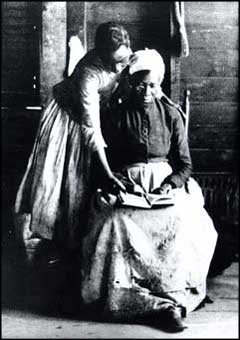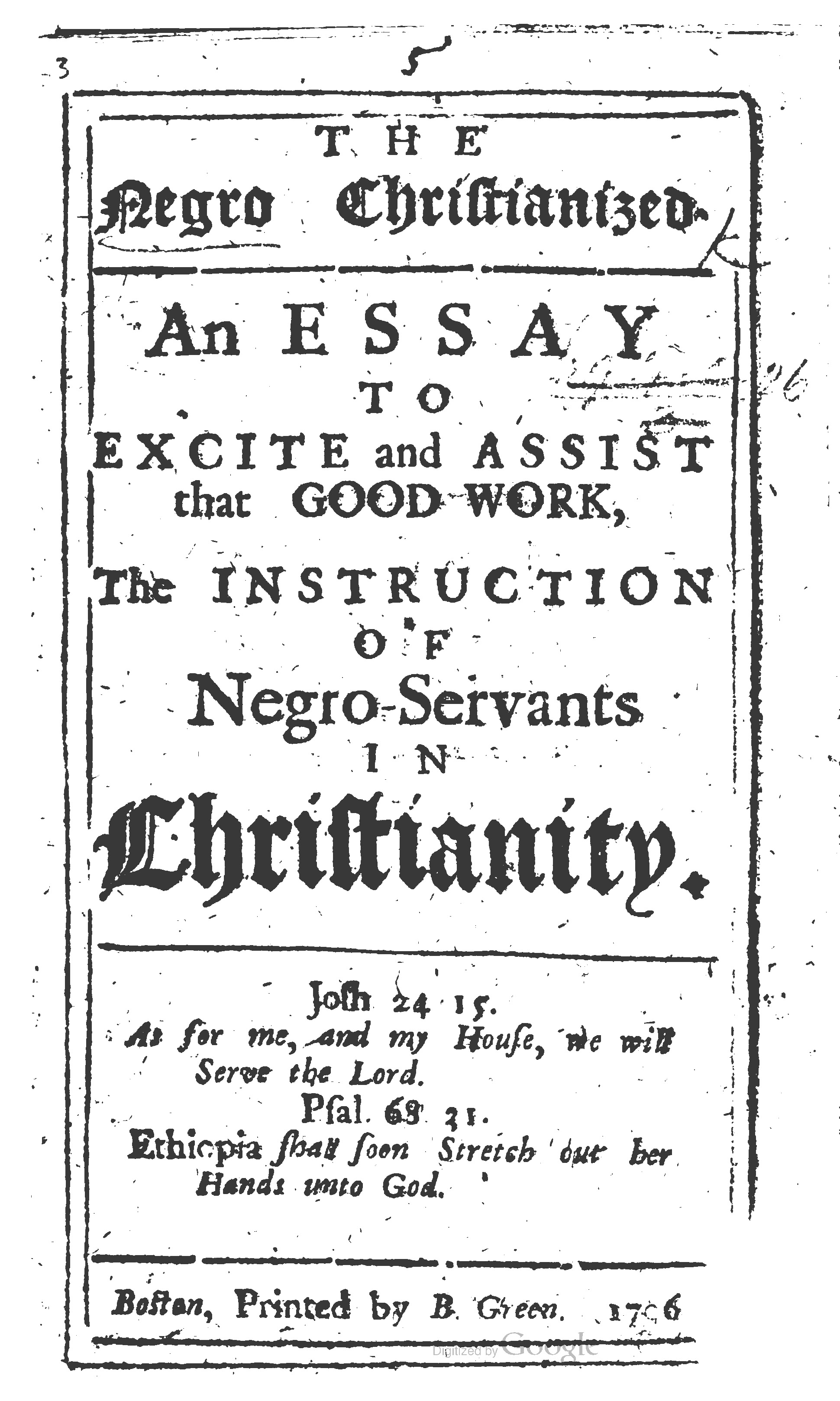Rethinking Early Slave Literacy

Last month, I wrote about how slaves and free blacks appropriated Euro-American languages and their ability to use them to their own advantage. Today, I want to explore the topic a bit more by focusing on literacy. Although I have written about Phillis Wheatley, most famous for publishing her poetry, I want to look at other slaves, many of whom learned to read and/or write, but rarely published. I am not suggesting that literacy was widespread amongst the enslaved, but rather considering the few who did acquire some semblance of literacy and examining what that meant. To do this, we need to explore the process of acquisition, slaves’ consumption of printed texts, and the form and meaning of writings by early African Americans. Once again, I’ll focus on New England.
Acquiring literacy was, at least in the case of New England, available for enslaved and free men and women. Certainly some masters resisted, such as when Boston slave and later literary figure Chloe Spear attempted to learn to read and her master threatened to punish her, exclaiming reading “made Negroes saucy.”1 Nevertheless, there were cultural imperatives overriding the hesitancy of individual masters. Religion was one of the most important factors. In Puritan Boston, being able to read the Bible was paramount to one’s salvation and having a true religious experience. Ministers exhorted their parishioners to teach their slaves how to read the Bible and other Christian texts. Leading minister Cotton Mather even published tracts on Christianizing slaves, although he was ambivalent about teaching slaves how to write. Likewise, many artisans and merchants taught their slaves at least basic literacy and numeracy to make them more effective workers. Whether reading religious texts or keeping accounts, this utilitarian literacy opened a whole new world to slaves, or to paraphrase Frederick Douglass, it gave them the inch that allowed them to take the ell.

Once African Americans learned to read and write, they instantly became consumers of printed and manuscript texts. Unfortunately for us, there is not a lot of evidence about what materials they read. There are a couple of tantalizing clues, however. The first comes from Reverend Timothy Cutler, minister of Christ Church in Boston (modern day Old North Church). In the late 1730s, Cutler complained that Boston’s black population was reading “bad books” that interfered with his attempts to Christianize them.2 Cutler was most likely referring to the influx of evangelical tracts into Boston on the eve of the Great Awakening. Cutler, a High Church Anglican, despised the evangelical impulse, while slaves and free blacks, in the process of Christianizing, used their literacy to shop in colonial America’s religious marketplace.
Black Bostonians also seemed to have consumed the town’s many newspapers. As the printing capital of New England, if not the American colonies, Boston’s newspapers covered stories on slavery. They ran stories of slaves involved in workplace incidents, rumors of slave conspiracies across the Atlantic world, and advertisements for runaways and slaves for hire or sale. For the latter, however, Boston masters had to advertise slaves in a peculiar manner, ultimately suggesting that slaves had access to the newspaper. When advertising a slave for sale, for example, slave owners rarely listed the name of the slave available or the name of the person who was selling. Instead, slave owners told interested buyers to “inquire of the printer.” Historian Robert Desrochers estimates that two-thirds of all for-sale advertisements in the Boston Gazette appeared in this form.3 If a slave could read or had a friend or compatriot who could read and discovered an advertisement listing them for sale, it could be motivation to run away or engage in other acts of resistance. Indeed, with such a literate slave population and so many involved in the world of printing, it is not hard to envision slaves flipping to the back of the latest edition of the Boston Gazette to see if they or someone they knew was listed for sale. Yet, it also suggests a deeper knowledge of the world, where slaves read stories in the newspaper about happenings around the globe and perused the goods Boston’s merchants had available for purchase.

While writing was much more limited than reading, slaves and free blacks still used it to participate in a larger world of written communication. It is in the writings of Caesar Lyndon that we see the meaning of literacy for early African Americans. Caesar Lyndon belonged to Josiah Lyndon, merchant, public official, and eventual governor of Newport, Rhode Island. Josiah prided himself on his own literary abilities, serving as a scrivener and clerk for the Rhode Island government for nearly 50 years. He taught Caesar those same skills. Josiah also gave Caesar considerable autonomy—and access to the family fortune. As such, Lyndon, although a slave, became an active businessman, renting out plots of land to enslaved and free blacks in Newport, trading items to Suriname, and importing the latest London fashions for his wife. To keep track of all of his financial endeavors, business and personal, Lyndon kept an account book—written in a beautiful hand—that doubled as a diary. Lyndon’s text is unique and is the only known slave diary to exist.

What are we to make of Caesar Lyndon’s diary? The diary was a common European form of writing and an individual testament and observation of the world by the author. In many ways, writing such a source not only allowed Lyndon to confront the world on his own terms, but also leave a written record of that confrontation. Writing documents such as these allowed slaves and free blacks, as the most marginalized members of Euro-American societies, to force their way into those societies, demand a place within them, and allow their voices to be heard for generations.
- Jared Ross Hardesty, Unfreedom: Slavery and Dependence in Eighteenth-Century Boston (New York: NYU Press, 2016), 115. ↩
- Ibid., 157. ↩
- Robert E. Desrochers, “Slave-for-Sale Advertisements and Slavery in Massachusetts, 1704-1781” The William and Mary Quarterly 59 No. 3 (July 2002), 634-635. ↩

Is it possible that this focus upon literacy in order to read the Bible in order to attain salvation is also one of the reasons for the relatively early abolition of slavery in New England? It seems that the two might be linked, especially when compared with the laws against slave literacy in Southern states.